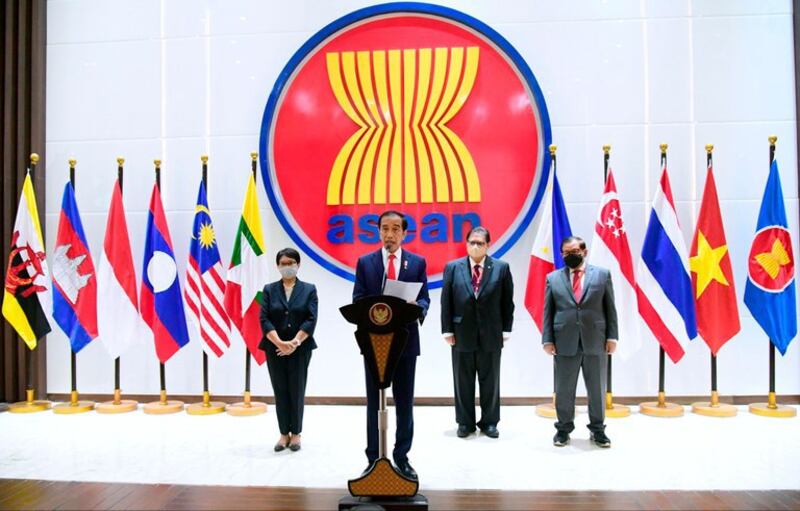Indonesia once helped Myanmar transition to democracy, using its own transformation out of military dictatorship as an example for change.
But a new plan by the 2023 chair of the Association of Southeast Asian Nations (ASEAN) to dispatch a senior general to Myanmar to nudge the Burmese junta back onto a democratic path may come to nothing, analysts say.
The current crop of military rulers is unlike the ones in 2011 who were open to listening to other nations, initiated the transition and even backed a political party to contest elections, however flawed, according to analysts.
“In the current situation, sending a general won’t be effective,” Dewi Fortuna Anwar, a political analyst at the National Research and Innovation Agency, an Indonesian agency, told BenarNews.
“Now the context is different. They have made the transition but the military took back power. They won’t back down because that’s the only way they can maintain power after repeatedly losing [elections].”
Back in 2011, “it was the Myanmar military that opened itself up to make a democratic transition,” she said.
“Myanmar openly welcomed assistance from Indonesia, both the TNI [Indonesian Armed Forces] and civilian political figures,” Dewi added.
Because of Indonesia’s history, regional observers have called on the country, the largest one in Southeast Asia and one of the founding members of ASEAN, to become a role model and help Myanmar restore democracy after the Burmese military ousted a civilian government two years ago.
President Joko "Jokowi" Widodo's predecessor, Susilo Bambang Yudhoyono, or SBY as he is known, played a significant role in Myanmar's democratic transition.
SBY, who was Indonesia’s first directly elected president and himself a former general, helped mediate conflicts between the Myanmar government and ethnic minorities, provided input on drafting democratic laws and invited officials to learn about democratic institutions.
Such interactions, though, diminished after a change in government in Jakarta in 2014 when Jokowi was elected president. Until last year, Jokowi had focused more on domestic affairs and shown little interest in diplomacy.
On Wednesday, the president announced plans to send a top general to Myanmar in an effort to resolve the political crisis there, as he approaches the end of his second and last five-year term.
In an interview with Reuters, Jokowi stated that the general would talk to Myanmar’s leaders about Indonesia’s democratization after the end of Suharto’s military-backed rule in 1998.
“This is a matter of approach. We have the experience, here in Indonesia, the situation was the same,” the president told Reuters. “This experience can be addressed, how Indonesia began its democracy.”

But the situation in Myanmar contrasts starkly to that of Indonesia at any time in the past, including during the autocratic rule of Suharto, said Greg Barton, an Asia scholar at Australia’s Deakin University.
Suharto, a former army general, came to power in 1967 when he took over from founding President Sukarno, after mass killings targeting suspected communists. Suharto resigned 31 years later amid political and economic upheaval.
“Suharto’s New Order regime was backed by the military but he kept the military in a relatively weak and poorly resourced state and relied heavily on technocrats to plan and direct development,” Barton said.
“The military in post-coup Myanmar is relatively well-resourced, is completely unaccountable, and is ruthlessly repressing its people by waging war against them.”
Therefore, the prospects for success for Jokowi’s planned initiative seem dim, Barton said.
“It would be nice to think that Indonesia might be able to initiate a process of change through a series of dialogues but that appears to be a very remote possibility this year,” he said.
The report about Jokowi’s plan came out on the same day that junta leaders placed Myanmar under six more months of emergency rule on the second anniversary of the coup.
Close to 3,000 people have been killed and more than 17,000 have been arrested in the two years that followed the Feb. 1, 2021, toppling of an elected government by the military.
‘Impossible to persuade them’
Observers in Myanmar, too, are pessimistic about Jokowi’s plan to send a military person to influence Sr. Gen. Min Aung Hlaing, the Burmese junta chief.
Nay Phone Latt, a spokesman for the National Unity Government (NUG), made up of democratically elected lawmakers who were ousted in the coup, said he recognized Indonesia’s effort to help but believed it would fail.
“I can’t think of any ways to reach an agreement with such aggressive military leaders,” he told Radio Free Asia (RFA), a news service affiliated with BenarNews.
“I think that Indonesia will learn in the future that they have failed to persuade the Myanmar military leaders.”
A Myanmar political and military analyst, Than Soe Naing, told RFA that Jokowi was “visionary and tactical.”
But Than Soe Naing was also skeptical about the outcome of the Indonesian president’s initiative, saying Myanmar’s ruling generals “have no sympathy for people’s desires or views, no political vision, [and] are ill-educated.”
“I think that it is impossible to persuade them to change.”
There is possibly one way to change the situation, according to Hunter S. Martson, a researcher on Asia at the Australian National University.
“The Indonesian general could be more influential if he delivers a strong message to the Myanmar junta that its ruinous policies are destabilizing the region and the military needs to abandon power or there will be consequences,” Marston told BenarNews.
Indonesia is unlikely to enforce economic sanctions, but it can make Myanmar’s situation difficult with the United Nations or within ASEAN, he said.
Marston said: “If the junta senses regional counterparts abandoning it, it might feel more pressure to reform.”
Pizaro Gozali Idrus in Jakarta and Radio Free Asia’s Burmese Service contributed to this report.
